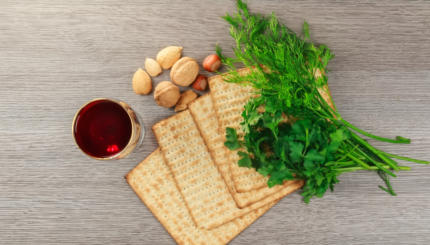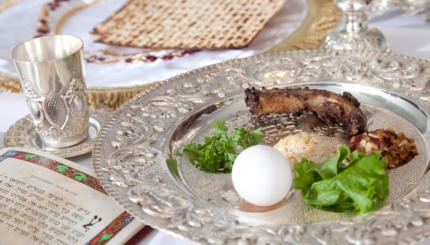Looking to change-up your this year? Archie Gottesman, FJC board member and self-proclaimed Marketing Jewru has spent the past few Passovers writing, compiling and curating a fun based on readings and songs she has found on various websites, traditional Haggadahs and other sources. Archie, besides being an advocate for Jewish camp, is the Chief Branding Officer of Manhattan Mini Storage, rebranded self-storage with ads like: Why Leave a City that has Six Professional Sports Teams, and also the Mets? and NYC: Tolerant of Your Beliefs, Judgmental of Your Shoes.
She is passionate about helping others see how much fun, joyous and meaningful Judaism it can be. Check out her version of a Haggadah and let us know how it enhances your seder.
Need some tips on how to enhance your seder? Archie suggests these simple steps to host a seder that will seriously impress your family and friends:
- The Seder Police: There are none. Yes, there are certain traditions to a seder. In fact, the word seder actually means “order,” and there is a specific order that you are supposed to follow. But if you’re the Seder Leader (SL), you are the master of the table. So if you want to have a rip-roaring seder, do whatever feels right. Personally, I think most Haggadahs are deadly dull. So many people take control and make their own Haggadahs. Feel free to download mine below, or make your own at www.haggadot.com. (But for God’s sake, don’t wait until the day before Passover.)
- Watch out for Too Much Hebrew (Aka Don’t Play “Who’s the better Jew?”): You know that uncomfortable feeling you get when you’re at a seder with like 15 people, and there are only four of them who know the words to some Hebrew song, and the rest of you sit there uncomfortably while they stumble through it? Me too. And it makes me feel like a bad Jew, wondering “Why didn’t my Jewish education prepare me for this?” This is NOT the feeling you want to elicit at your seder. So if you’re going to include Hebrew, make sure your guests understand it, or keep it to a minimum.
- Haters Gonna Hate: Last year, I was helping my friend Jenna lead a seder, and just as everyone was sitting down at the table, Jenna’s mother-in-law proclaimed, “Let’s make this quick; I’m hungry!” Are you kidding me? Nothing like a comment like that to take the wind right out of yours sails. Just know that problematic people will make negative comments sometimes, and power through it. (At the end of the night, Nasty Mother-In-Law actually said it was the best seder she had ever been to. Oh, snap!)
- Prepare, Prepare, Prepare: If SLs spent as much time preparing their seder service as cooks spend preparing the seder meal, celebrating Passover would be a lot more meaningful. But what happens all too often is that the SL thinks he/she can just wing it – and they can’t. You have to spend real time preparing your seder. It will make all the difference. Seders do not have to be boring, but SLs do need to step it up.
- Know Your Audience: Who’s going to be at your seder? If you’re having Jews and non-Jews, then be prepared to explain a lot of stuff. Hell, even if it’s only Jews coming, you should still give explanations. I have been going to seders my entire life, and it was not until I put together my own Haggadah that I really learned the details. If you are hosting a cerebral group of guests and want to go around the room and ask what freedom means to each of them, go right ahead; but don’t try that with a crowd like mine. If you’re having a bunch of kids over, make sure you either serve appetizers or have snacks on the table. And I am not opposed to setting up A Rugrats Passover in the den for the kids who hit the wall.
- Wine is Your friend: Not much to say about this one except it’s more fun singing Dayeinu with a buzz.
- The Jews Are Counting on You: Leading a kick-ass seder is important! What if it’s the only Jewish experience your cousin Rachel has the entire year? It’s your job to inspire her with some fun and spirituality. Yes, that’s a lot of pressure, but you’re up to it! Now go have a fabulous Pesach!



